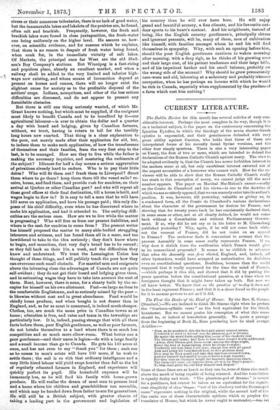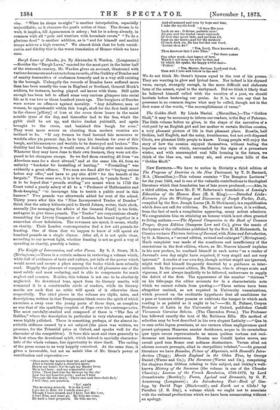The First Six Books of the Iliad of Homer. By
the Rev. E. Simms. (Stanford.)—We are inclined to think Mr. Shunts right when he prefers the "fourteen-syllable verse" as the best equivalent for the Greek hexanieter. But we cannot praise his conception of what this verso should be, or indeed of translation generally. We quote a passage from the beginning of Book IL, Zeus pondering how he shall avenge Achilles :— " Now, as he pondered, this the best and surest counsel seems,
Forthwith to send to Atreus' son the phantom-god of dreams. He spake the word forth-calling him;—out of his shadowy rest The Dream-god came ; said Zeus to him these winged words addressed: ' Away, thou Dream-god, baste away: among the ships alight, Enter the tent of Agamemnon, when he sleeps to-night; Truthfully tell him what I tell thee; charge him with all speed Arm and array his long-haired host, to do a glorious deed. Now may he Troy assail and take that spactous-streeted town, And for himself and mailed troops achieve a high renown! For they that on Olympos' height the heavenly mansions share, The Immortal ones, one purpose have, all won by Here's prayer : To him shall glory be,—WTroy disaster and despair:"
Some of these lines are as harsh as they can be, none of them rise much above the merit of being capable of being scanned. And the translation is equally faulty and weak. "The phantom-god of dreams" is meant for a prettiness, but cannot be taken as an equivalent for the signifi- cant simplicity of otae, 'ovum ; "out of his shadowy rest the Dream-god came" represents nothing in the original, while the second half of the line omits one of those characteristic epithets- which so perplex the translator of Homer, but which he never ought to surrender,—haf
Dias. "When he sleeps to-night" is another interpolation, especially unjustifiable, as it obscures the poet's notion of time. The dream is to wait, it implies, till Agamemnon is asleep ; but he is asleep already, in common with all "gods and warriors with horsehair crests." "To do a glorious deed" is another addition, as is "and for himself and mailed troops achieve a high renown." We almost think that for both versifi- cation and fidelity this' is the worst translation of Homer which we have seen.



































 Previous page
Previous page